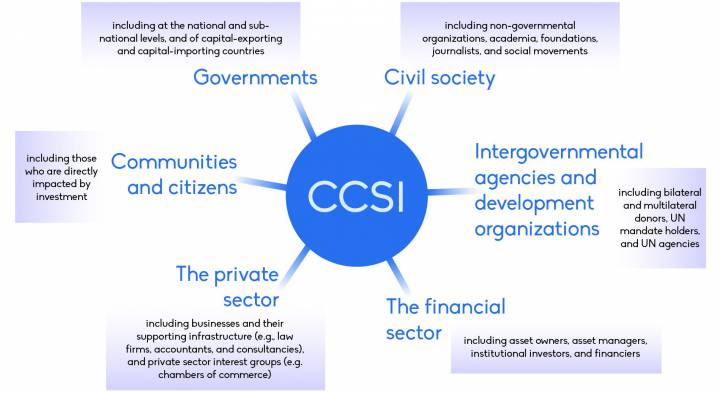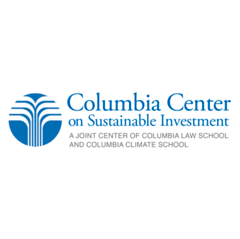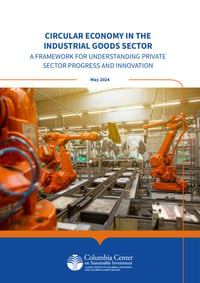This organisation has not been claimed yet. If you're a representative of this organisation, you can claim it on ESG.Guide.
Claim organisationAbout Organisation
About Us
The Columbia Center on Sustainable Investment (CCSI), a joint center of Columbia Law School and Columbia Climate School at Columbia University, works to strengthen the sustainable development potential of international investment, and to ensure that international investment is mutually beneficial for investors and the citizens of recipient countries. We envision a world in which international investment contributes to, and does not undermine, sustainable development.
We develop and disseminate practical approaches to maximize the benefits of international investment for sustainable development—and to minimize its harms—by conducting rigorous research, providing policy analysis and advisory services, offering educational programs, developing tools and resources, and fostering multi-stakeholder dialogue and knowledge-sharing.
We integrate legal, economic, and policy expertise, and approach sustainable investment holistically, bridging diverse disciplines, including investment law, natural resource management, human rights law, economics, political economy, finance, and climate change policy. One of our great strengths lies in having knowledgeable perspective across the range of stakeholders, tools, policies, and practices that shape investment flows and outcomes. This allows us to work across communities of practice and with different stakeholder groups, and to provide insight and solutions at the intersections of these often-siloed areas relevant to sustainable investment.
Learn more about our Focus Areas and Model.
The Context
Foreign direct investment (FDI) is a major global economic force, delivering 65% more goods and services to foreign markets than trade. Such investment can play a crucial role in advancing sustainable development: it facilitates the transfer of capital, knowledge, and technology, and can help to create jobs, develop linkages between local industries, promote infrastructure development, build local capacity, and foster links between countries. FDI also serves as a fundamental source of financing for development, central to implementing the Sustainable Development Goals (SDGs) and bridging the $2.5 trillion annual funding shortfall experienced by developing countries in SDG-related sectors.
However, the benefits that FDI can produce for recipient countries are not automatic. The extent to which the positive effects are realized and the challenges and negative impacts avoided, depends on the policies and practices of governments and investors, and on the institutions available to find satisfactory outcomes for all stakeholders. Against this background, and guided by its five-pillar framework, CCSI works to provide the tools, research, and holistic support necessary to maximize the benefits of investment for sustainable development.
Our Approach
Our mission is to develop and advance policies and practices that shape investment to contribute to, rather than undermine, sustainable development.
Learn About Our Vision
We strive for a world in which international investment contributes to, and does not undermine, sustainable development. Sustainable development includes improved human wellbeing, reduced inequalities, the protection and realization of human rights, and the protection of the planet and its ecosystems.
In this world, host governments have the tools and incentives to attract, encourage, and shape investment that advances the interests and wellbeing of all citizens. Project-affected individuals and communities can effectively participate in decision-making concerning, and oversight of, investment projects that impact them. Mechanisms to resolve disputes between communities and project proponents, as well as between governments and companies, are consistent with rule of law principles and the primacy of human rights. National and international governance systems progressively reduce economic, social, legal, and political inequality. And businesses, their investors, their lawyers, and the financial sector ensure their activities align with social, environmental, and human rights goals and principles, in policy and in practice.
See Why We Focus on Investment
Achieving our vision will demand a tremendous mobilization and realignment of both public and private investment. It will require new investments and will require existing investors and companies to change their practices to contribute to overall growth. Foreign direct investment (FDI) and the activities of multinational enterprises play a fundamental role. FDI mobilizes capital, knowledge, technology, job creation, economic linkages, and infrastructure development; yet, without proper governance, such investment has also been a source of corruption, social degradation, environmental devastation, and other negative outcomes. The extent to which the positive effects are realized and the harms avoided depends on the policies and practices of governments, companies, investors, and a range of national and international institutions and stakeholders.
Understanding the drivers, incentives, impacts, opportunities and trends of investment governance and business activities, in particular with respect to our global goals for sustainable development and human rights, is critical to underpin policy-making, business decision-making, and public engagement.
Our Areas of Focus
How We Work
We work in three iterative steps:
- We help establish an evidence-based understanding of the effects and implications of legal and policy frameworks and practices, of future drivers and trends, and of a range of proposed solutions regarding the outcomes and impacts of international investment.
- We disseminate and advance ideas for reforming investment frameworks and practices through convenings, publications, and formal and informal engagement with key stakeholders.
- We develop and provide tools, resources, training, and support to help stakeholders take steps to improve the sustainable development outcomes of investment.

We support and create new opportunities for traditionally underrepresented stakeholders to influence investment policy, decision-making, and governance. For example, this includes spaces for investment-affected communities and their allies, as well as for citizens and officials from lower income countries.
We apply a politically sensitive approach across our work. This builds on our early leadership in integrating a political lens into practice through the work of the Executive Session on the Politics of Extractive Industries.
Our Stakeholders & Collaborators
We support, partner with, and leverage the expertise of a vast network of stakeholders:

CCSI has also defined a five-pillar framework for sustainable international investment that underpins our mission and approach.
Click here for CCSI's Theory of Change.
Latest Reports
view allCIRCULAR ECONOMY IN THE INDUSTRIAL GOODS SECTOR
A FRAMEWORK FOR UNDERSTANDING PRIVATE SECTOR PROGRESS AND INNOVATION




